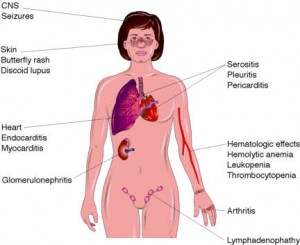Selena Gomez Cancels Concerts Due to Lupus?
Last week, pop singer/actress Selena Gomez cancelled her upcoming concert dates in Asia and Australia. The 21 year old released a statement:
“My fans are so important to me and I would never want to disappoint them. But it has become clear to me and those close to me that after many years of putting my work first, I need to spend some time on myself in order to be the best person I can be. To my fans, I sincerely apologize and I hope you guys know how much each and every one of you mean to me.”
However, PopDust is reporting that Selena was diagnosed with Lupus 2 years ago, that that recent flare-ups of that disease have caused her to cancel the upcoming tour. Symptoms have included facial swelling, extreme fatigue, headaches and joint pain. Their source said:
“Selena has been going full throttle the past few years and her Lupus is really catching up with her right now. She knows that she needs to take some time to address the disease and look after herself better if she wants to live a full and healthy life.”
It’s good to see a young celebrity actually putting their health first!
Apparently Selena is not happy that her diagnosis has been revealed. A friend told Hollywood Life:
“Selena will not be happy that this is out there, she really wanted to keep this to herself. She doesn’t want it to effect people’s opinions of her and what she’s capable of. This is her own personal business and she wants to keep it that way.”
IMHO, of course Selena should have privacy if she wants it, however she could do so much good by talking about her illness- how it doesn’t define her, how you can still live a long productive life if you take care of yourself, what new research is being done to help patients with the disease, and so on….
What is Lupus?
Lupus, short for systemic lupus erythematosis (SLE), is an autoimmune disease in which the body attacks itself. The immune system fails to recognize the difference between the body’s own cells and tissues and”foreign” substances such as the bacteria and viruses that our immune systems normally protect us against.
Anyone can get lupus, but it is most common among girls and women. More than 90% of people with lupus are female. In the US, lupus is more likely to occur among people who are of African-American, Hispanic-Latino, and Native American descent. In addition, African-Americans and Hispanic/Latinos tend to develop lupus at a younger age and have more severe symptoms than white Americans. According to the Lupus Foundation of America, between 1.5 and 2 million Americans have some form of lupus, and this includes some 5-10 thousand children.
Lupus is often difficult to diagnose. It’s often mistaken for other diseases and has been called the “great imitator.” The signs of lupus differ from person to person. Some people have just a few signs; others have more.
- Red rash or color change on the face, often in the shape of a butterfly across the nose and cheeks
- Painful or swollen joints
- Unexplained fever
- Chest pain with deep breathing
- Swollen glands
- Extreme fatigue (feeling tired all the time)
- Unusual hair loss (mainly on the scalp)
- Pale or purple fingers or toes from cold or stress
- Sensitivity to the sun
- Low blood count
- Depression, trouble thinking, and/or memory problems.
Other signs are mouth sores, unexplained seizures (convulsions), “seeing things” (hallucinations), repeated miscarriages, and unexplained kidney problems.
How is Lupus Treated?
Diagnosing and treating lupus often require a team effort between the patient and several types of health care professionals. Most people will see a rheumatologist for their lupus treatment. A rheumatologist is a doctor who specializes in rheumatic diseases (arthritis and and other inflammatory disorders, often involving the immune system).
The goals of the treatment plan are to:
- Prevent flares
- Treat flares when they occur
- Reduce organ damage and other problems.
Treatments may include drugs to:
- Reduce swelling and pain
- Prevent or reduce flares
- Help the immune system
- Reduce or prevent damage to joints
Medications used to treat lupus include:
For people with joint or chest pain or fever, drugs that decrease inflammation, called nonsteroidal anti-inflammatory drugs (NSAIDs), are often used. Ibuprofen and Naproxen are common NSAIDs.
Antimalarials are another type of drug commonly used to treat lupus. These drugs were originally used to treat malaria, but doctors have found that they also are useful for lupus. A common antimalarial used to treat lupus is hydroxychloroquine
Corticosteroids, such as prednisone, hydrocortisone, methylprednisolone, and dexamethasone, are related to cortisol, which is a natural anti-inflammatory hormone. They work by rapidly suppressing inflammation.
For some patients whose kidneys or central nervous systems are affected by lupus, a type of drug called an immunosuppressive may be used. Immunosuppressives, such as cyclophosphamide and mycophenolate mofetil, restrain the overactive immune system by blocking the production of immune cells.
BLyS-specific inhibitors: Belimumab, a type of agent referred to as a B-lymphocyte stimulator (BLyS) protein inhibitor, was approved by the U.S. Food and Drug Administration (FDA) in March 2011 for patients with lupus who are receiving other standard therapies, including those listed above. Given by IV infusion, belimumab may reduce the number of abnormal B cells thought to be a problem in lupus.
Are you concerned about lupus, For a lupus checklist click here.
For more information, see our Resounding Health casebook on systemic lupus erythematosis.




























0 comments